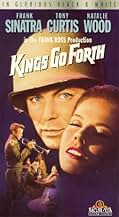Verso la fine della seconda guerra mondiale, due soldati americani che combattono nel sud della Francia iniziano una relazione sentimentale con una giovane donna americana. Il suo background... Leggi tuttoVerso la fine della seconda guerra mondiale, due soldati americani che combattono nel sud della Francia iniziano una relazione sentimentale con una giovane donna americana. Il suo background rivelerà più cose su di loro che su di lei.Verso la fine della seconda guerra mondiale, due soldati americani che combattono nel sud della Francia iniziano una relazione sentimentale con una giovane donna americana. Il suo background rivelerà più cose su di loro che su di lei.
- Cpl. Lindsay
- (as Edward Ryder)
- Jazz Musician: Trumpet
- (non citato nei titoli originali)
- Blairs' Butler
- (non citato nei titoli originali)
- Old Frenchwoman with Wine
- (non citato nei titoli originali)
- Jazz Musician: Tenor Sax
- (non citato nei titoli originali)
- Jazz Musician: Drums
- (non citato nei titoli originali)
- Jazz Musician: Vibraphone
- (non citato nei titoli originali)
- Captain Harrison
- (non citato nei titoli originali)
- Jazz Musician: Guitar
- (non citato nei titoli originali)
- Jazz Musician: Bass
- (non citato nei titoli originali)
Recensioni in evidenza
Tony Curtis’ part as the smooth-talking but put-upon charmer is effectively an extension of his Sidney Falco in Alexander Mackendrick’s SWEET SMELL OF SUCCESS (1957). The female roles are equally well filled: a lovely 19-year old Natalie Wood plays a young mulatto American raised in France who comes between Army “buddies” Sinatra and Curtis, while 35-year old Leora Dana is cast as Wood’s proud middle-aged mother (she must have quite impressed Sinatra because she was in SOME CAME RUNNING too – as Arthur Kennedy’s wife).
The film – backed by a fine score from Elmer Bernstein and including a jam session featuring Curtis and real-life jazz musicians – is well enough made scene by scene and certainly well acted, but the effect is slightly diluted by the unnecessary and ultra-soapy coda (Sinatra losing an arm, Dana dying, Wood gathering together and teaching war orphans – but especially the corny children’ song at the very end). The film is much more of a romantic melodrama than it is a war movie, but the few action sequences therein are good and well spread out throughout the film.
Delmer Daves may have been best renowned for his Westerns – but his very first shot as a director had actually come via a war movie, DESTINATION TOKYO (1943), and he eventually returned to the same territory intermittently with PRIDE OF THE MARINES (1945), TASK FORCE (1949) and, finally, KINGS GO FORTH itself.
Pleasing and enjoyable story about love , race and war with a great trio : Sinatra , Wood and Curtis
This wartime movie picture is an enjoyable tale with an interesting characterizing about a few characters , tragic drama and evocative outdoors from French Riviera , including some war scenes . The film utilizes an oft-used storyline of the war movie genre which has two soldiers in love with the same girl . This stirring as well as intimate story is a passionate retelling and a touching triangular drama . The storyline relies heavily on the continued relationship among them ; in spite of , the movie results to be better than average , being surprisingly good and compellingly realized . Based on a novel by Joe David Brown with thought-provoking screenplay by Merle Miller . Nice acting by trio protagonist , all of them give fine performance along with a fine support cast such as Karl Swenson and special mention of Leora Dana as mummy Blair . Thrilling as well as moving Original Music by the maestro Elmer Bernstein . Atmospheric and adequate Cinematography by Daniel L. Fapp .
The motion picture was professionally directed by Delmer Daves , though not particularly satisfying on either race front or the war . Daves was a good professional , he began as a technical adviser on films with a college background . Soon afterward he entered films as an actor, and after appearing in several pictures he began collaborating on screenplays and original stories. He wrote scripts for many of Hollywood's best films of the 1930s and 1940s, including The Petrified Forest (1936) and Love affair (1939) . Turning director with the classic Destination : Tokio (1943), Daves often wrote and produced his own pictures. Of the many films he made, the westerns he did were especially close to his heart ; as a youth he had spent much time living on reservations with Hopi and Navajo Indians . As he was a Western expert such as proved in ¨The hanging tree¨ , ¨3:10 to Yuma¨, ¨The last wagon¨, Jubal , ¨Drum beat¨, ¨Return of the Texan¨, ¨Cowboy¨ and the notorious ¨Broken arrow¨ .
Frank Sinatra narrates the story with him as one of the protagonists. He's an army lieutenant and he's just gotten some replacements for his company, one of them being Tony Curtis. Curtis is a spoiled rich kid, a real smooth operator. But he turns out to be a good soldier and he and Sinatra become friends despite Sinatra being an officer and Curtis non-com.
Then the two of them get interested in the same girl, Natalie Wood. She's an American expatriate living with her widowed mother, Leora Dana. Her father was a black man and they left the United States many years before to escape ruling prejudices. Ironic that they escape to France and then France gets occupied by the real prejudice merchants.
The film is divided equally, half of it concerning the war and half of it dealing with the romantic triangle. For the second time in his career, the first being in Sweet Smell of Success, Tony Curtis plays a heel and does it well. Curtis was really coming into his own as a player and not just a pretty face. Kings Go Forth was filmed on the heels of his Oscar nominated performance in The Defiant Ones.
Frank Sinatra gives one of his best screen performances in Kings Go Forth. None of the hipster slang, not the nebbish of his forties musicals, Sinatra plays a really good man trying to deal with his own inner conflicts about what he's been brought up to believe and the feelings he has for Wood. It's something different and Sinatra does it well.
Natalie Wood was as beautiful as they come and Leora Dana as her mother who's seen too much of the world and is determined to protect her daughter has some of her best screen moments. Tony Curtis liked working with Natalie Wood very much in the films they made together, but he does mention in his autobiography it would have really been great if someone like Dorothy Dandridge had been cast in her role. It might have made Kings Go Forth better remembered today, as much as classic as Guess Who's Coming To Dinner.
Elmer Bernstein did the film score and one of the themes was given a lyric by Sammy Cahn and became the song Monique after Natalie Wood's character. Frank Sinatra made a hit record of it though it is only heard instrumentally in the film. It's one of his loveliest ballads.
Viewers should see the film before hearing Sinatra's record of it. The whole premise of the film is the plain Sinatra and the smooth Curtis competing for Wood. You hear old Blue Eyes sing Monique and you'll find it hard to believe why he didn't just sing that song.
Why Natalie would have melted right away in his arms.
I thought Natalie Wood and Tony Curtis were just great in this movie, as was Leora Dana as Natalie's mother. Wood never received her due as an actress and I thought her French accent was just fine. Curtis is absolutely chilling in his confrontation with Dana and Wood and it is easy to understand why Sinatra would want to kill Curtis. I think Sinatra is somewhat miscast as the "ugly duckling" who pines for Wood. After all, we've all seen too many movies where Sinatra's won the hearts of girls as pretty as Wood (if there ARE any other girls as pretty as Wood). Watching the film again, I couldn't help but wonder what Charles Bronson could have done with Sinatra's role. Nonetheless, given the potentially explosive (at that time) interracial element, it is unlikely "Kings Go Forth" would have been made without Sinatra's participation. Further, the episodic structure of "Kings Go Forth" plays against the sexual tension of a love triangle. Finally, the ending is almost annoyingly noncommittal. It shouldn't be; after all, there are enough clues as to what should eventually transpire between the principals. I think, here, the problem continues to be Sinatra. He is simply too aloof and passionless.
Given my criticisms, you may be surprised to know I really like "Kings Go Forth." I give it a "7". Oh, and for the record, the French ARE, historically, a VERY racially tolerant people. Witness "Cajuns," the French and Indian War, Josephene Baker and their acceptance of Indo-Chinese Eurasian children.
Lo sapevi?
- QuizThe role of Monique was originally written with Dorothy Dandridge in mind.
- BlooperCameraderie between Sam (an officer) and Britt (an enlisted NCO whose rank goes up and down as the story unfolds), is unmilitary and unreal, particularly their calling each other by their first names.
- Citazioni
1st Lt. Sam Loggins: How do you feel about riding in a jeep?
Mrs. Blair: It's one of the several experiences I promised myself before I die. Another is jumping out of a parachute.
1st Lt. Sam Loggins: No, dear. You jump out of a plane. You hold onto the parachute.
- ConnessioniReferenced in In Person (1993)
I più visti
- How long is Kings Go Forth?Powered by Alexa
Dettagli
- Data di uscita
- Paese di origine
- Lingue
- Celebre anche come
- Kings Go Forth
- Luoghi delle riprese
- Aziende produttrici
- Vedi altri crediti dell’azienda su IMDbPro
- Tempo di esecuzione1 ora 49 minuti
- Colore
- Proporzioni
- 1.85 : 1
































